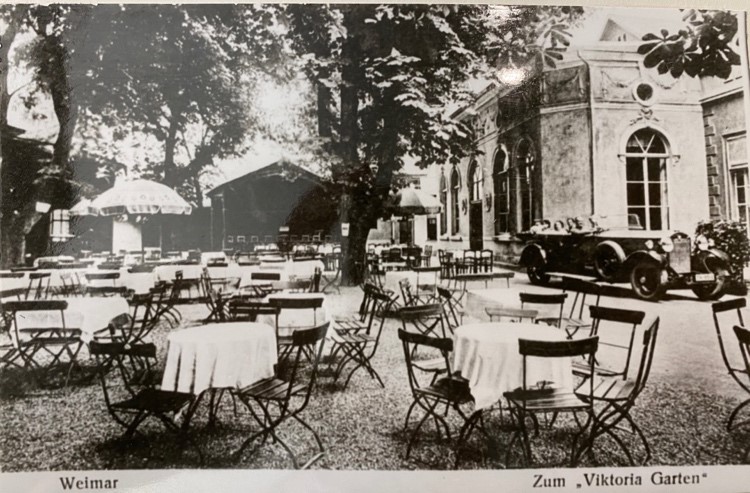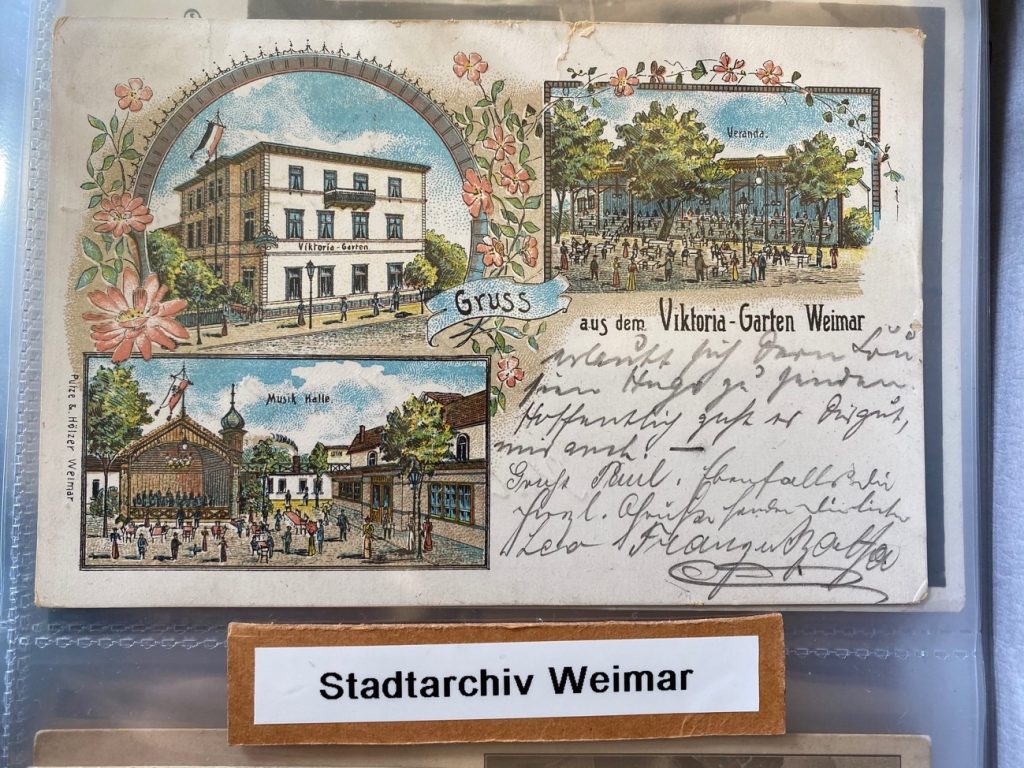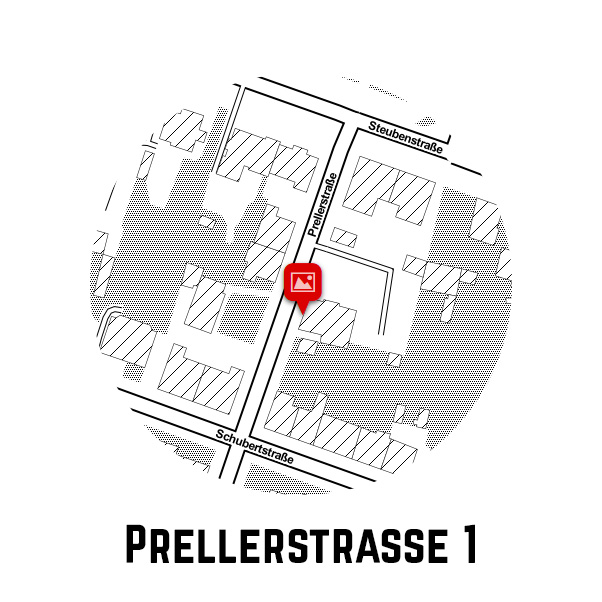Caroline Meyer zu Eppendorf and Paula Borzner
This Station on Instagram
It's a hot Saturday afternoon in 1926, you're strolling along the streets of Weimar with your friends and you feel like having a refreshment. On your left you see a restaurant - the "Viktoria-Garten". You enter the building and drink a cold beer, while you enjoy the music that can be heard from the courtyard. Time flies, you have fun, laugh and are in good company. Afterwards you buy a postcard offered by the restaurant to remind you of the beautiful afternoon (see fig. 2).
From 1908 to 1947, in the Prellerstraße 1[2] the "Viktoria-Garten“ was located: at first sight a comfortable restaurant with a concert garden. However, an extremely problematic institution was concealed within the restaurant: the Colonial Home of Weimar.
At that time there were some guests of the "Viktoria-Garten", who were members of the Kolonialverein (Colonial Association), but probably also some visitors who left their money there and supported the restaurant financially without thinking about what was going on there.
The interior of the restaurant was divided into a guest room, a lounge, a hall and a bowling alley.[3] The exterior area consisted of a garden with an adjacent music hall.

The "Viktoria-Garten" was not only used as a restaurant and concert garden, but also served as a venue for the meetings of the Colonial Association, which always took place on the first Saturday of the month.[4] The picture of the garden shown here dates back to 1894.[5]
After guests visited the "Viktoria-Garten", they had the opportunity to send a postcard offered by the colonial home to remember the visit.[6]
The head of the Colonial Home was senior secretary Karl Hucke, who lived at Herbststraße 15. In addition to manager Hucke and an innkeeper, the Colonial Home also had its own police constable, Georg Flamm, who felt responsible for internal security. The association also organized a "colonial youth group" .[7]
Until 1925 the building was owned by the Swiss Feldschlösschen Brewery. In 1925 the ownership of the Viktoria-Garten went to Feldschlösschen's biggest competitor - the Deinhardt Brewery, Weimar's city brewery.[8] The Viktoria-Garten was well known and popular. Therefore, the Kolonialverein could connect to the public at an important social space in Weimar.

In the same year the so-called "Association of Africans, East Asians and Colonial Friends of Weimar" leased the Viktoria-Garten to build their colonial home.[9]
They intended to employ the head waiter Alfred Raddatz, who registered a concession, i.e. right of use, on July 1, 1925. The authorities requested a certificate of conduct and other documents to determine whether the concession should be granted.[10]
For unknown reasons, however, Raddatz withdrew the concession application. Subsequently, the innkeeper Otto Loeper took over the vacant position. He submitted an application for a concession to the city administrator.[11] Loeper, like Raddatz, was examined by the authorities. The application was approved on 28.07.1925 and on 01.08.1925 the colonial home opened its doors.
In addition, Loeper also had to obtain permission as an innkeeper. This allowed him to serve brandy, beer and spirits in certain rooms of the colonial home. However, Loeper did not remain active as an innkeeper for the entire time that the colonial home existed. As early as 1928, Friedrich Wehmeyer took over the role of innkeeper. Wehmeyer, too, did not remain the last innkeeper of the Colonial Home. At regular intervals, the innkeepers resigned their posts and passed them on to a new one. The predecessors were often prosecuted by the police.[12]
After this description of the foundation of the colonial home at Prellerstraße 1, the fields of activity of the local association will be explained.
First and foremost, the Colonial Association pursued the goal of "uniting all members of the Reich who were active in military or civil relations in colonial German or non-German possession, as well as all colonial friends".[13] so that the association could build a network in which colonial ideas could be spread. The association thus anchored colonial thought in the Weimar city society.
In order to strengthen this network, a focus was placed on "maintaining and cultivating internal camaraderie by sharing experiences in the colonies". According to its own description, it was also important to the association to promote and maintain the "love and loyalty to the fatherland". [14] A profoundly nationalistic mentality becomes apparent in this statement.
Their last motivation was "to make it their duty to spread the colonial idea among the people and to make it clear to them that such a large people as the German Colonies and thus their produce in raw materials etc. is absolutely necessary."[15]
These goals and tasks defined the central colonial basic ideas of the colonial home. The rise of colonial revisionism during the Weimar Republic was very compatible with the "blood and soil" ideology of National Socialism. It can be assumed that many supporters of the colonial idea were also supporters of the NSDAP, since the ideology of National Socialism was based on that of colonialism and imperialism.
In 1947, the Deinhardt Brewery planned to build a movie theater. From this information it can be concluded that from 1947 Prellerstraße 1 was no longer leased by the colonial association. However, these plans were not carried out and from 1953 the building served as a coal storage area for the brewery.[16]
Today, the beverage store of Ronald Bock is located at Prellerstraße 1. When the owner first entered his newly acquired store, he found a copper casting on the wall depicting the colonial home and its interiors with the slogan "Gruß aus dem Kolonialheim“ ("Greetings from the colonial home"). This was the only trace of the institution that Bock found.[17]
The beverage store is now known as a popular late-night shopping destination and is a much frequented place where students go to get their beer after the doors of the supermarkets are already closed.
It is a depressing idea that many people from Weimar spent their free time in the Viktoria-Garten, which was also the headquarters of a nationalist colonial association. Though they existed in almost every German city during the Weimar Republic and played an important role in the persistence of a colonialist, nationalist, and oppressive ideology, today there is no critical indication that the colonial home ever existed in this place.
Endnotes
[1] Copper castings from private property of Ronald Bock (colonial home)
[2] Signature Stadtarchiv Weimar: 60 3-2/20
[3] Concession application Raddatz, Signature Stadtarchiv Weimar: 60 0/10 and picture provided by Ronald Bock
[4] Register of residents of the city of Weimar, Oberweimar and Tiefurt, 1928, 1st part p. 24
[5] Photo book about restaurants in Weimar, Signature 60 10-5/45 Bd.5 in the Stadtarchiv Weimar
[6] Photo book of postcards from Weimar, Signature 60 3-5/20 in the Stadtarchiv Weimar
[7] Register of residents of the city of Weimar, Oberweimar and Tiefurt, 1928, 1st part p. 24
[8] Cf. 60 3-2/20
[9] Register of residents of the city of Weimar, Oberweimar and Tiefurt, 1928, 1st part p. 24
[10] Application for concession, Signature Stadtarchiv Weimar: 62 0/10
[11] Application city director, Signature Stadtarchiv Weimar: 62 0/10
[12] Police prosecution, Signature Stadtarchiv Weimar: 62 0/10
[13] Register of residents of the city of Weimar, Oberweimar and Tiefurt, 1928, 1st part p. 24
[14] Cf. ibid.
[15] Cf. ibid.
[16] Photo book of postcards from Weimar, Vol. 13, Signature 60 3-5/20 in the Stadtarchiv Weimar
[17] Personal conversation with Ronald Bock from 26.11.2019
